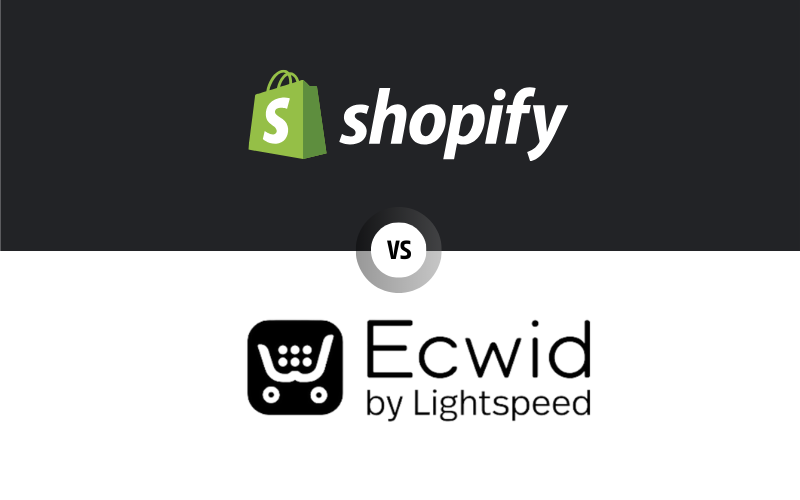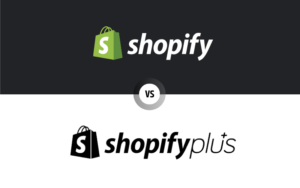In the dynamic world of online commerce, choosing the right e-commerce platform is a critical decision for any business. With a myriad of options available, two platforms often stand out for their robust features and user-friendly interfaces: Shopify and Ecwid. Understanding these platforms’ core functionalities, strengths, and differences is essential for business owners looking to establish or grow their online presence.
Shopify Overview:
Shopify is a leading e-commerce platform that offers businesses a comprehensive toolkit to create a full-fledged online store. Known for its scalability and extensive customization options, Shopify caters to a wide range of businesses, from small startups to large enterprises.
Ecwid Overview:
Ecwid, on the other hand, provides a more streamlined approach to e-commerce. It allows you to add a shopping cart to an existing website, which makes it a popular choice for business owners who want to start selling online without the need for a complete website overhaul.
Choosing the Right Platform:
The decision between Shopify and Ecwid hinges on several factors, including:
- The size and growth trajectory of your business
- The level of customization and control you desire
- Your budget for e-commerce platform services
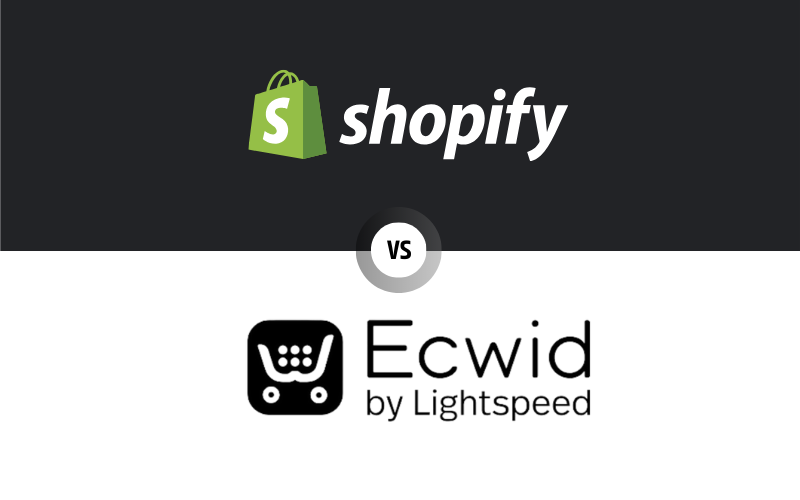
Both platforms offer distinct advantages, and the right choice will depend on your business’s specific needs, goals, and the customer experience you wish to provide.
This introduction sets the stage for a deeper exploration into the features, security, reliability, global commerce capabilities, and scalability of Shopify and Ecwid, helping you to make an informed decision on which platform is best suited for your e-commerce journey.
| Feature Category | Shopify | Ecwid | Notes |
|---|---|---|---|
| Ease of Use | ✅ | ✅ | Both platforms are known for their user-friendly interfaces. |
| Design and Customization | ✅ | ✅ | Shopify offers more themes; Ecwid is more about widget integration. |
| Product Management | ✅ | ✅ | Both allow for comprehensive product and inventory management. |
| Payment Gateways | Multiple options | Multiple options | Shopify has its own payment solution; Ecwid is compatible with numerous payment gateways. |
| Transaction Fees | Varies | None | Shopify charges fees unless using Shopify Payments; Ecwid has no transaction fees. |
| Third-party Integrations | ✅ | ✅ | Shopify has a larger app marketplace. |
| Pricing | Multiple tiers | Free to premium | Shopify does not have a free plan; Ecwid offers a limited free plan. |
| Customer Support | 24/7 support | Limited hours | Shopify is known for better support options. |
| SEO Features | ✅ | ✅ | Both offer basic SEO tools, but Shopify has more advanced options. |
| Mobile Management | ✅ | ✅ | Both offer mobile apps for store management. |
| Multi-channel Selling | ✅ | ✅ | Both platforms support selling on social media and other marketplaces. |
| International Sales | ✅ | ✅ | Both support multiple languages and currencies. |
| Security | ✅ | ✅ | Both are PCI DSS compliant and offer secure shopping carts. |
| Scalability | High | Moderate | Shopify is better suited for large-scale businesses due to its advanced features. |
| Bandwidth and Performance | Unlimited | Unlimited | Neither platform limits bandwidth, but performance can depend on the chosen plan. |
| Templates and Themes | Extensive | Limited | Shopify offers a wider range of professional themes. |
| Custom Domain | ✅ (Paid Plans) | ✅ (Paid Plans) | Free plans may use platform-specific subdomains. |
| App Store/Marketplace | Extensive | Moderate | Shopify has a more extensive app marketplace. |
| Point of Sale (POS) Options | ✅ | ✅ | Both offer POS solutions, but Shopify’s is more integrated. |
| Inventory Management | Advanced | Basic to Advanced | Shopify provides more advanced inventory features on higher plans. |
| Abandoned Cart Recovery | ✅ (Paid Plans) | ✅ (Paid Plans) | Available on higher-tier plans for both platforms. |
| Discounts and Gift Cards | ✅ | ✅ | Both platforms allow for the creation of discounts and gift cards. |
| Reporting and Analytics | Advanced | Basic to Advanced | Shopify offers more detailed reports, especially on higher plans. |
| Blog Integration | ✅ | Via plugins | Shopify has built-in blogging capability; Ecwid requires third-party integrations. |
| SSL Certificate | Free SSL | Free SSL | Both provide SSL certificates for secure transactions. |
Table of Contents
Ease of Use Shopify vs. Ecwid
For any online retailer, the ease of use of their e-commerce platform is a fundamental aspect that can significantly influence the efficiency of setting up and managing an online store. Here, we compare the ease of use of Shopify and Ecwid to help you determine which platform aligns with your technical skills and business needs.
Shopify is renowned for its user-friendly interface, which provides a smooth experience for users of all skill levels. The dashboard is intuitively designed, with clear navigation that guides you through the process of adding products, creating collections, setting up payments, and managing orders. For newcomers, Shopify offers a step-by-step wizard to help set up the basic elements of the store.

Shopify’s drag-and-drop website builder allows merchants to customize their storefronts without any coding knowledge. This visual approach to site design makes it easy to see changes in real-time and adjust the layout to fit your brand’s aesthetic.
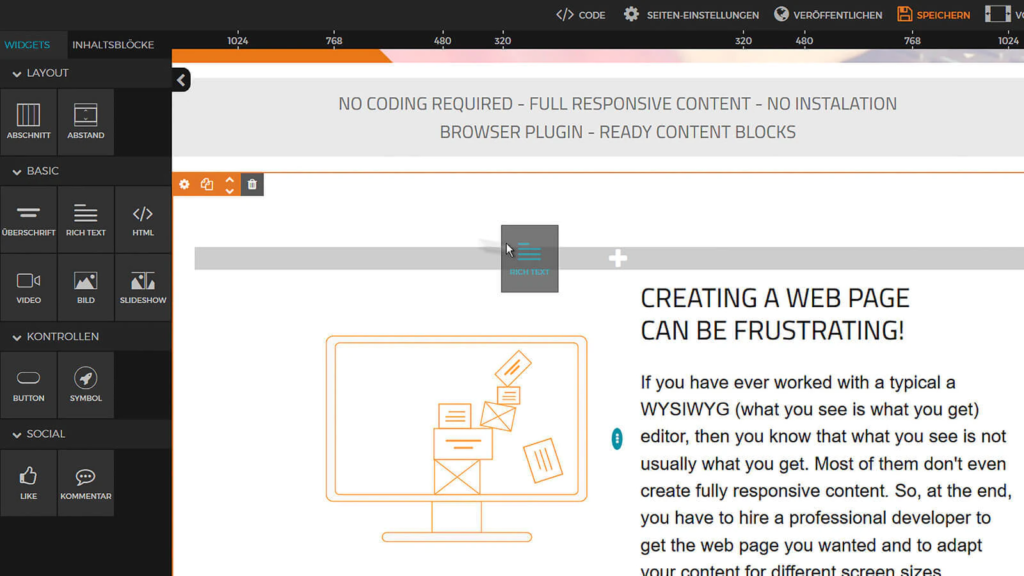
Moreover, Shopify provides extensive documentation, tutorials, and 24/7 customer support to assist users with any questions or issues that arise, enhancing the platform’s ease of use.
Ecwid, on the other hand, shines with its plug-and-play approach, especially when it comes to adding e-commerce functionality to an existing website. The platform is designed to be straightforward and requires minimal effort to integrate with your current site, making it an attractive option for those who want to start selling quickly without overhauling their website.

Ecwid’s control panel is clean and easy to navigate, allowing for simple management of products, orders, and inventory. The process of adding products and configuring settings is streamlined, which is ideal for those who prefer a no-fuss approach to online selling.

Both platforms offer mobile applications, enabling merchants to manage their stores on the go. These apps provide the flexibility to keep track of orders, inventory, and customer interactions from anywhere, which is a boon for business owners who are always on the move.

In terms of ease of use, both Shopify and Ecwid offer user-friendly interfaces and tools geared toward simplifying the process of running an online store. Shopify is particularly well-suited for those who want a comprehensive, standalone e-commerce platform with an easy-to-use website builder. Ecwid is ideal for adding e-commerce to an existing website with minimal hassle and disruption.
Ultimately, the choice between Shopify and Ecwid will depend on your specific needs, the level of customization you desire, and how you want to integrate e-commerce into your existing online presence. Both platforms aim to make the merchant experience as straightforward and efficient as possible.
Design and Customization
When it comes to creating an engaging and unique online store, design and customization are at the forefront of a merchant’s toolkit. Let’s delve into how Shopify and Ecwid handle these pivotal features.
Shopify stands out with its wide range of customizable themes and design options. The platform offers a variety of free and paid themes, each with its own set of customizable features to match different industries and aesthetics. Whether you’re looking for a minimalistic approach or a feature-rich design, Shopify’s theme store has something for every type of business.

With Shopify, customization goes beyond just themes. The platform’s website builder provides extensive options for tweaking the look and feel of your store. You can easily adjust colors, fonts, and layouts, as well as add or remove various elements through a user-friendly interface. For those with coding knowledge, Shopify also allows direct editing of the HTML and CSS, offering complete control over the design.

Ecwid, while not as comprehensive as Shopify in terms of design, still provides a solid range of customization options that cater to the needs of most small to medium-sized businesses. Ecwid can be seamlessly integrated into any existing website, adopting the site’s inherent style and making it look like a natural extension of the original design.

Ecwid’s theme selection is more limited compared to Shopify, but the available themes are responsive and customizable. Through Ecwid’s control panel, merchants can modify colors, adjust product layouts, and change fonts without needing to touch any code. For those who want more customization, Ecwid also allows access to CSS overrides, which can be used to further tailor the store’s appearance.
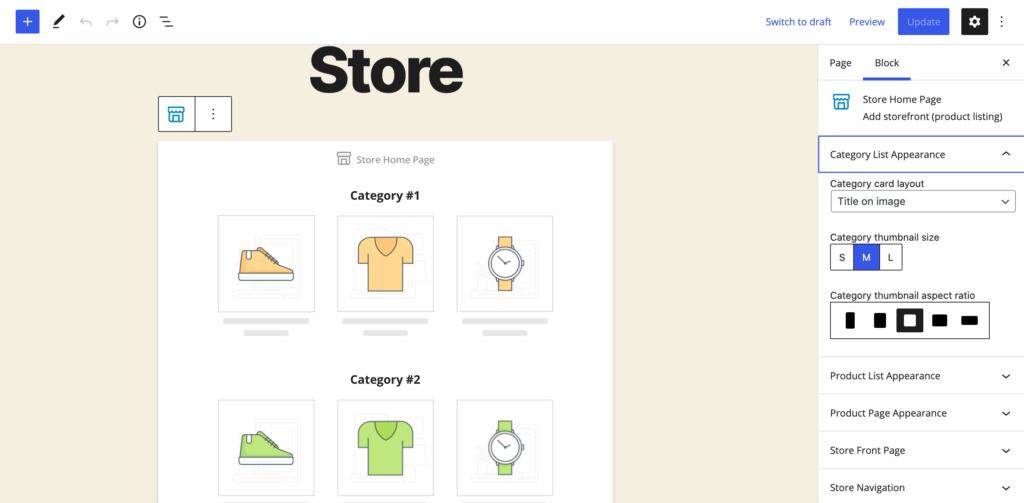
Both platforms offer a responsive design, ensuring that online stores function well and look great on any device, from desktops to smartphones. This is crucial for providing a consistent shopping experience across all platforms.
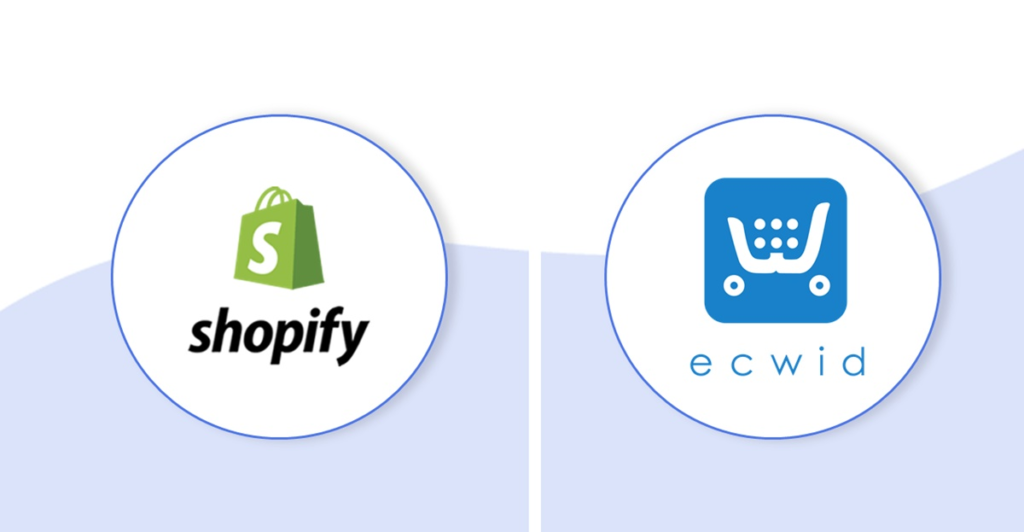
In the realm of design and customization, Shopify may be the preferred choice for businesses that prioritize a wide array of design options and the ability to deeply customize their online store. Ecwid is a strong contender for those seeking ease of integration with their current website and sufficient customization capabilities to create a cohesive look.
Merchants must weigh their need for creative control against the ease of implementation to decide which platform will best serve their design and customization needs. Both Shopify and Ecwid offer the tools to create a professional and aesthetically pleasing online presence that resonates with your brand and appeals to your target audience.
E-commerce Features and Functionality
Selecting the right e-commerce platform is critical for the success of your online business. The e-commerce features and functionality offered by the platform can make or break your operations, influencing everything from inventory management to customer satisfaction. Let’s explore the offerings of Shopify and Ecwid in this regard.
Shopify is well-regarded for its extensive e-commerce features and functionality. It is a comprehensive solution designed to cater to businesses of all sizes, with an array of built-in tools to manage products, inventory, payments, and shipping. Shopify’s robust platform provides merchants with:
- A powerful product management system that allows for bulk uploads, variations, and digital products.
- Integrated payments with Shopify Payments, as well as support for a wide array of third-party payment gateways.
- Advanced inventory management capabilities, including tracking and adjustments.
- Comprehensive shipping solutions with calculated rates, label printing, and integration with major carriers.
- Marketing and SEO tools to help increase online visibility and drive sales.
- A suite of analytics and reporting tools to track performance and inform business decisions.

Shopify also supports a thriving app store with thousands of apps that extend the functionality of your store in areas such as customer service, email marketing, and loyalty programs.
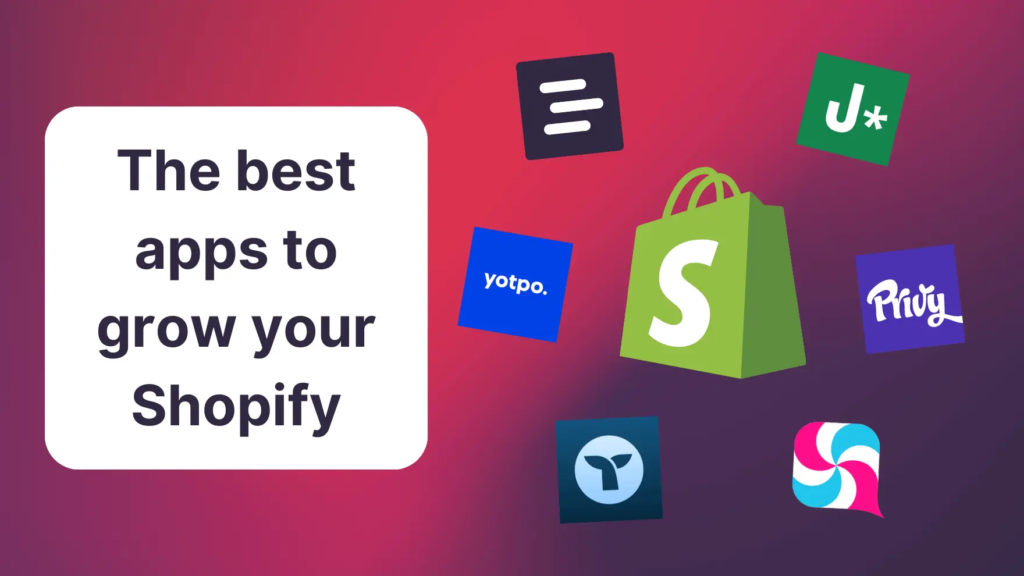
Ecwid, on the other hand, is known for its ease of integration and simplicity. It is best suited for small to medium-sized businesses looking to add e-commerce functionality to their existing websites or to sell across multiple sites simultaneously. Ecwid offers:
- A straightforward product management system that is easy to use for adding and editing products.
- Compatibility with multiple payment providers, enabling transactions from all over the globe.
- Basic inventory tracking that meets the needs of smaller stores.
- Shipping options that include setting up various rates and methods, although not as advanced as Shopify’s.
- SEO tools to help products get found in search engines.
- Access to basic analytics for tracking store performance and customer behavior.

While Ecwid may not have as many built-in features as Shopify, its app market includes a variety of plugins that can help enhance your store’s capabilities.
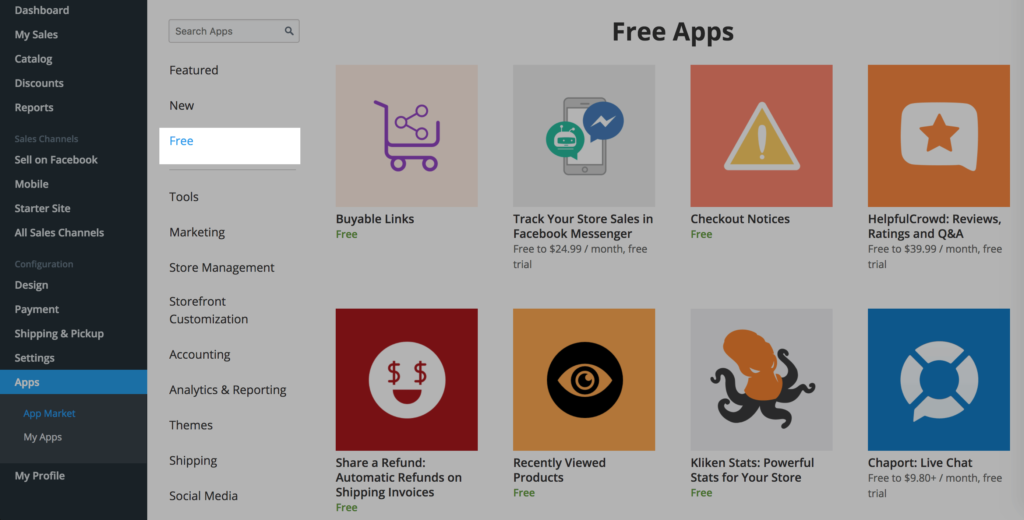
When it comes to e-commerce features and functionality, Shopify is the more robust platform, offering a wide range of tools and options for businesses that are scaling or require a high degree of customization. Ecwid, with its user-friendly approach, is a solid choice for merchants who need a simple yet effective e-commerce solution that works with existing websites and social media platforms.
In conclusion, both Shopify and Ecwid have their strengths and can serve different types of businesses based on their specific e-commerce needs. It’s important for merchants to consider the scale, complexity, and future growth of their business when choosing between these platforms to ensure they select the one that provides the features and functionality they require for their online store.
Payment Gateways and Transaction Fees
The ability to process payments securely and efficiently is a cornerstone of any successful e-commerce operation. Payment gateways and transaction fees are critical considerations for online merchants, as they can impact both the customer experience and the merchant’s bottom line. Let’s compare how Shopify and Ecwid handle these important e-commerce elements.
Shopify offers its own payment solution, Shopify Payments, which is powered by Stripe. Using Shopify Payments simplifies the payment process by eliminating the need for a third-party gateway, and it comes with several benefits:
- No additional transaction fees: When you use Shopify Payments, Shopify waives the additional transaction fees that are normally charged on top of payment gateway fees.
- Integrated checkout experience: Customers stay on your store during checkout, which can help increase conversion rates.
- Multiple payment options: Supports credit cards, Apple Pay, Google Pay, and other popular payment methods.
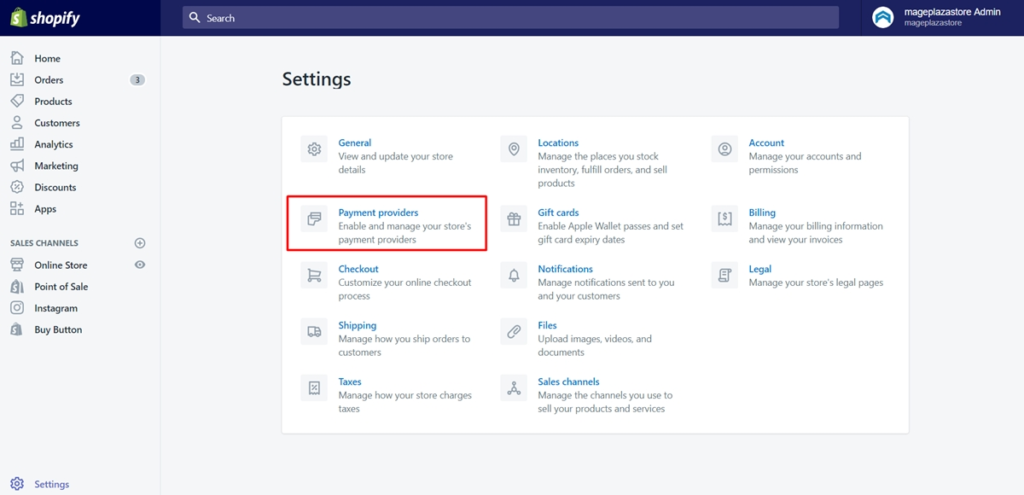
However, if you choose not to use Shopify Payments or if it’s not available in your country, Shopify also supports a wide range of third-party payment gateways. It’s important to note that using an external payment gateway with Shopify incurs transaction fees on top of the payment processor’s fees, which vary depending on your Shopify plan.
| BASIC | SHOPIFY | ADVANCED | |
|---|---|---|---|
| Pricing | |||
| PAY MONTHLY | $32 USD/mo | $92 USD/mo | $399 USD/mo |
| PAY YEARLY (SAVE UP TO 25%) | $24 USD/mo | $69 USD/mo | $299 USD/mo |
| TRANSACTION FEES | 2% | 1% | 0.5% |
Ecwid, in contrast, does not have its own payment gateway but offers a significant amount of flexibility by supporting over 50 payment providers worldwide, including PayPal, Stripe, and Square. This gives merchants the ability to choose the gateway that best fits their business needs and geographical location. Ecwid’s key payment features include:
- No additional transaction fees: Ecwid does not charge extra transaction fees, regardless of which payment gateway you choose.
- Secure and diverse payment options: Like Shopify, Ecwid supports a variety of payment methods, offering a secure and comprehensive payment experience for customers.
- Easy integration: Payment gateways can be quickly connected to your Ecwid store through simple setup processes.

Both platforms offer SSL encryption during checkout to ensure that customer data is transmitted securely. This is not only crucial for customer trust but also a requirement for PCI compliance.

When choosing between Shopify and Ecwid for payment gateways and transaction fees, merchants must consider the balance between offering a broad range of payment options and minimizing transaction fees. Shopify Payments is a great choice for those looking for an integrated solution with potentially lower fees, while Ecwid’s wide support for third-party gateways provides flexibility without the extra transaction costs.
In summary, both platforms aim to offer seamless and secure payment experiences for online shoppers while giving merchants control over their payment processing and fees. Carefully evaluate each platform’s offerings against your business model, sales volume, and customer preferences to make an informed decision that aligns with your financial goals and operational needs.
Integration and Plugins
E-commerce platforms are not just about selling products; they’re about creating an ecosystem that supports various business functions. This is where integration and plugins come into play, expanding the capabilities of your online store. Understanding the integration and plugins available on Shopify and Ecwid can help you determine which platform best suits your business needs.
Shopify is renowned for its extensive integration capabilities. The platform offers a rich app ecosystem through the Shopify App Store, where you can find thousands of plugins to enhance your store’s functionality. These plugins cover a wide range of categories, including marketing, sales, customer service, inventory management, and more.
- Extensive App Store: Shopify’s App Store contains a comprehensive selection of plugins, both free and paid, that can be seamlessly added to your store.
- Custom Integration: For businesses with specific needs, Shopify also allows for custom app development and integration via its robust API.
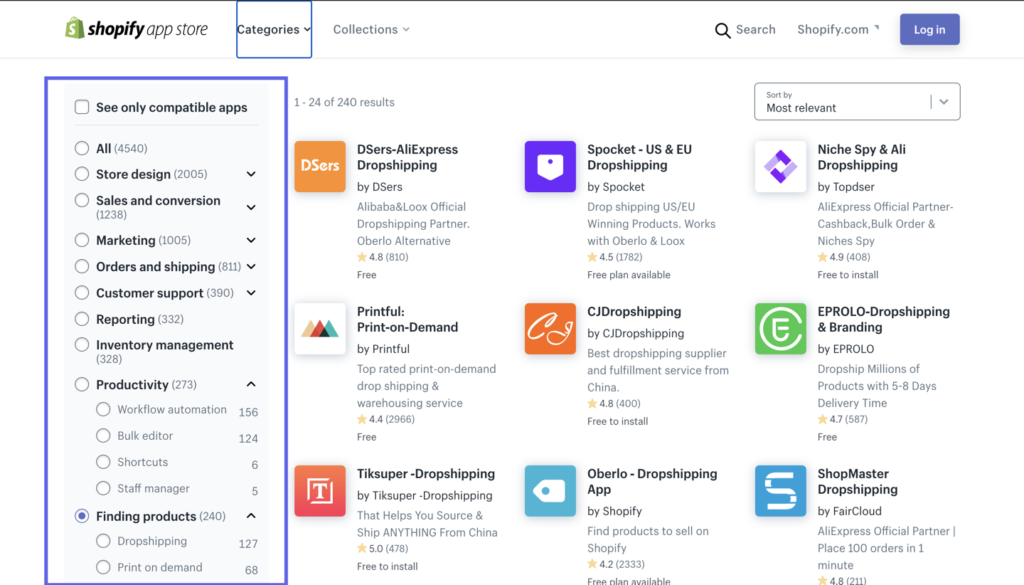
Shopify’s integration capabilities allow for automation of processes, improved customer relationship management, and enhanced analytics. This can lead to a more efficient operation and a better understanding of your customers.
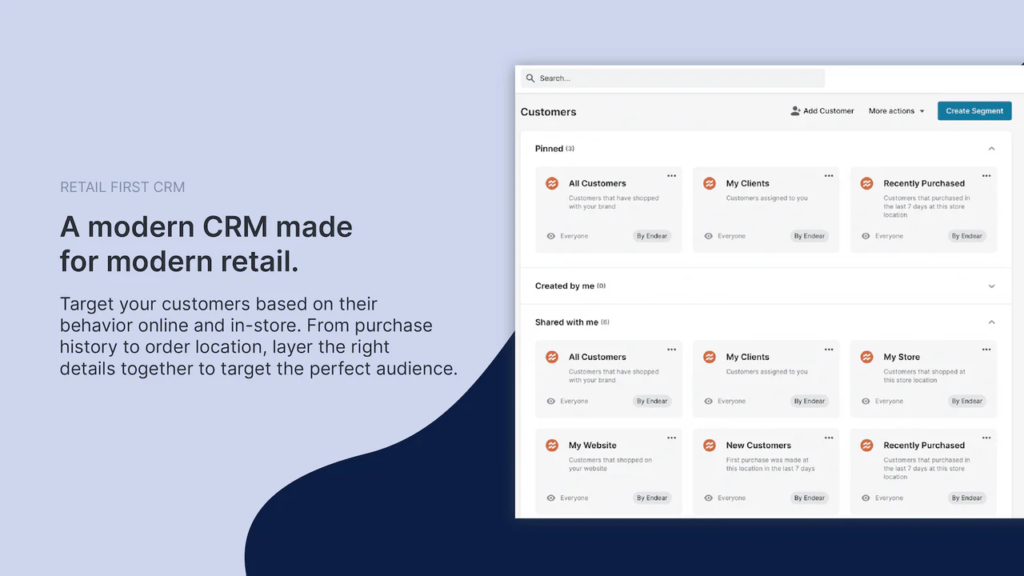
Ecwid, while offering a smaller selection compared to Shopify, still provides a solid range of plugins through its Ecwid App Market. The platform focuses on essential integrations that cater to the core needs of a small to medium-sized e-commerce business.
- Targeted App Market: Ecwid’s App Market, while smaller, includes carefully curated plugins aimed at enhancing specific aspects of your store.
- Ease of Use: Ecwid’s plugins are designed for straightforward integration, making it easy for merchants to add new features without technical expertise.
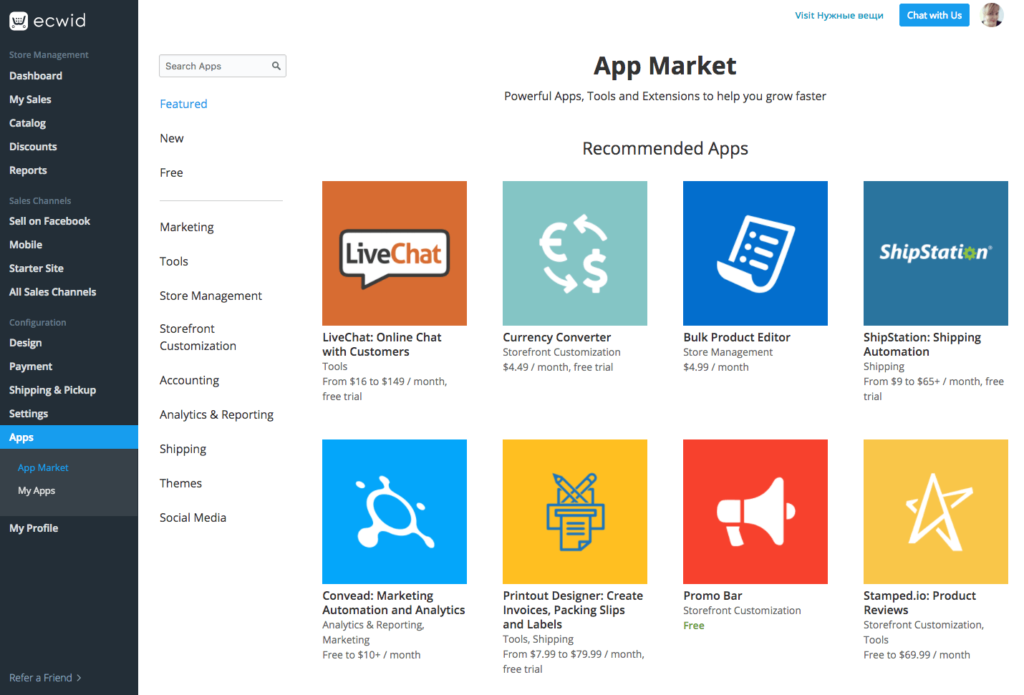
Ecwid also supports integration with various website builders like WordPress, Wix, and Weebly, among others, allowing you to add e-commerce functionality to existing websites with ease.

Both Shopify and Ecwid are strong in their integration and plugins offerings, but the choice between them depends on the scale and complexity of your needs:
- If you’re looking for a platform with a vast array of specialized plugins that can cater to every possible need and you’re willing to invest in additional functionalities, Shopify is the way to go.
- If you prefer a simpler platform that covers the basics with less complexity, Ecwid might be more suitable.
In conclusion, integration and plugins are essential for enhancing the functionality of your e-commerce store and improving the overall user experience. When deciding between Shopify and Ecwid, consider the types of integrations you need, the level of customization you desire, and the resources you’re willing to allocate to maintain and optimize these plugins. Both platforms provide a variety of options that can help elevate your online store to meet your specific business objectives.
Pricing and Plans
When launching an online store, one of the most crucial considerations is the cost of setting up and running your e-commerce platform. Understanding the pricing and plans for both Shopify and Ecwid is essential to selecting a service that fits your business budget and needs.
Shopify Pricing and Plans
Shopify offers a tiered pricing structure designed to accommodate businesses of all sizes:
- Basic Shopify: This plan is best for new e-commerce businesses with occasional in-person sales. It provides all the essentials for starting a new business.
- Shopify: Suitable for growing businesses selling online or in-store.
- Advanced Shopify: Best for scaling businesses that require advanced reporting.
Each plan comes with its own set of features, and as you move up the tiers, you gain access to more advanced tools like professional reports, lower credit card rates, and lower transaction fees. Additionally, Shopify offers an enterprise-level solution known as Shopify Plus, which is tailored for high-volume merchants and comes with additional features and support.

Shopify also charges transaction fees unless you use Shopify Payments, and credit card rates decrease as you move to higher-tier plans.
| BASIC | SHOPIFY | ADVANCED | |
|---|---|---|---|
| Pricing | |||
| PAY MONTHLY | $32 USD/mo | $92 USD/mo | $399 USD/mo |
| PAY YEARLY (SAVE UP TO 25%) | $24 USD/mo | $69 USD/mo | $299 USD/mo |
| TRANSACTION FEES | 2% | 1% | 0.5% |
Ecwid Pricing and Plans
Ecwid takes a slightly different approach to pricing with a focus on providing a cost-effective solution for small to medium-sized businesses:
- Free: Ecwid offers a forever-free plan with basic features, perfect for merchants just starting out and wanting to test the waters without financial commitment.
- Venture: This plan adds features like discount coupons and advanced SEO tools.
- Business: Best for growing businesses, adding features like inventory management and advanced support.
- Unlimited: This top-tier plan includes all features such as POS integration and priority support.
Ecwid’s pricing model is appealing because of the free plan and the absence of transaction fees across all plans. The paid plans offer progressively more features and support, and there’s also a 0% transaction fee policy, which means you only pay the payment gateway’s fees.
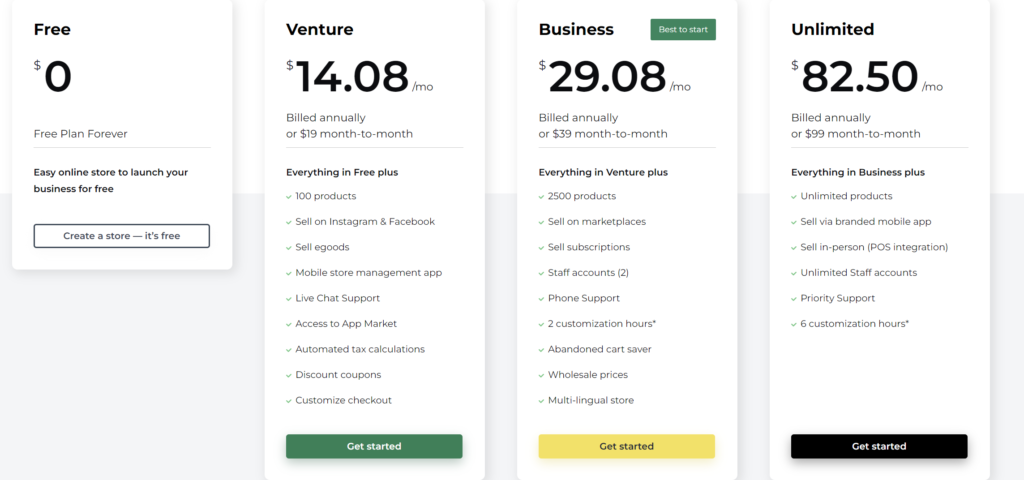
| Venture | Business | Unlimited | |
|---|---|---|---|
| TRANSACTION FEES | 0% | 0% | 0% |
In summary, both Shopify and Ecwid offer a range of pricing options that cater to different business sizes and needs. Shopify’s plans are more structured and come with the potential for additional transaction fees, whereas Ecwid’s pricing is straightforward with its 0% transaction fee policy across all plans.
When considering pricing and plans, it’s important to not only look at the monthly or annual cost but also to consider the overall value each platform brings to your business. Factor in the additional costs like transaction fees, credit card rates, and the cost of any additional plugins or integrations you may require.
Carefully assessing your business requirements and growth projections will help you make an informed decision about which e-commerce platform, Shopify or Ecwid, offers the pricing and plans that align with your business strategy and financial capabilities.
Support and Community
For any e-commerce platform, the level of support and the strength of the community are vital for users to navigate through challenges and grow their businesses. Both Shopify and Ecwid offer different kinds of support and boast vibrant communities that can be invaluable resources for merchants.
Shopify Support and Community
Shopify is known for its extensive support system and a large, active community. Here’s what you can expect from Shopify:
- 24/7 Support: Shopify provides round-the-clock support via email, live chat, and phone, ensuring that help is available whenever you need it.
- Help Center: A comprehensive repository of articles, guides, and tutorials to help you manage and grow your Shopify store.
- Community Forums: The Shopify Community forums are a place where merchants can connect, share experiences, and seek advice from fellow users.
- Shopify Academy: A selection of free training courses and tutorials to help you learn about running an e-commerce business.
- Shopify Experts: Access to a marketplace of certified professionals who can be hired for various tasks and projects related to your Shopify store.

The Shopify community also includes a range of developer forums and user groups, which can be immensely helpful for troubleshooting and networking.

Ecwid Support and Community
Ecwid also offers solid support options and community resources, tailored to its user base:
- Free Support: Ecwid provides free support options via chat and email, which are available for all users, including those on the free plan.
- Premium Support: Higher-tier plans offer telephone support and priority service, which can be very useful for urgent issues.
- Ecwid Help Center: Similar to Shopify, Ecwid has an extensive knowledge base with articles and video tutorials to help you with the setup and management of your store.
- Ecwid Community Forums: A place for Ecwid users to engage with one another, ask questions, and share their store experiences.
- Ecwid Education: Offers various resources including webinars and guides on how to maximize the use of Ecwid for your business.
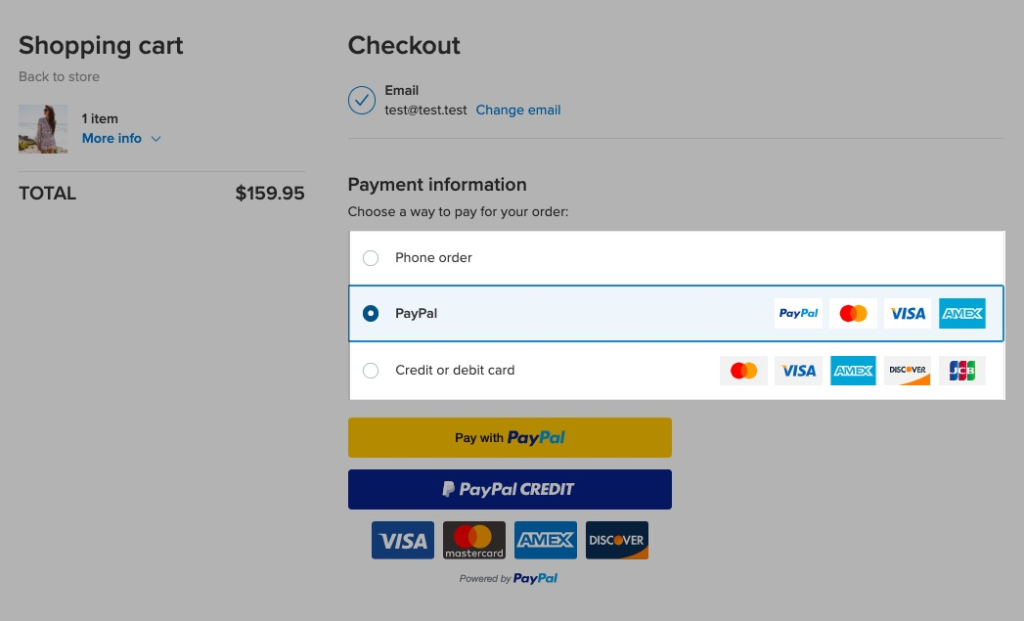
Ecwid’s community may not be as large as Shopify’s, but it is growing and provides a supportive environment for merchants.

Both platforms encourage third-party developers and experts to contribute to their ecosystems, providing users with additional resources for custom solutions and specialized assistance.
In conclusion, both Shopify and Ecwid understand the importance of support and community in the e-commerce space. Shopify offers a more comprehensive support system and a larger community network, which can be beneficial for businesses that require extensive resources and networking opportunities. Ecwid, while smaller in scale, still provides a robust support framework suitable for small to medium businesses, ensuring that all merchants have access to the help they need.
When evaluating Shopify and Ecwid on support and community, consider the level of support you anticipate needing, how much you value community interaction, and whether access to professional services like Shopify Experts or Ecwid’s recommended professionals is important for your business growth. Both platforms are equipped to help you succeed, but the right choice will depend on your specific business needs and preferences.
SEO and Marketing Tools
In the digital marketplace, your e-commerce platform’s built-in SEO and marketing tools are crucial for attracting and retaining customers. Both Shopify and Ecwid offer a suite of features to help optimize your online store for search engines and to execute effective marketing campaigns.
Shopify SEO and Marketing Tools
Shopify is well-equipped with SEO features that help ensure your store ranks as high as possible on search engine results pages (SERPs):
- SEO-Friendly Site Structure: Shopify’s themes are designed with SEO in mind, with features like customizable H1, title, and meta tags.
- Automatic Sitemaps: Shopify automatically generates sitemaps.xml files, which help search engines more intelligently crawl your site.
- Clean URLs: The platform creates logical and clean URLs for each page, which is a best practice for SEO.
- Blogging Platform: Shopify includes a blogging platform that you can use to create content-rich pages, which helps in ranking for various keywords.
- App Integration: Shopify’s App Store has numerous SEO apps that can further enhance your store’s visibility in search engines.

In the realm of marketing, Shopify offers:
- Email Marketing: Built-in email marketing tools allow you to create, send, and track emails directly from the Shopify admin.
- Marketing Automation: Tools like Shopify Email and Kit help automate your marketing campaigns.
- Social Media Integration: Shopify stores easily integrate with various social media platforms, enabling social selling and marketing.
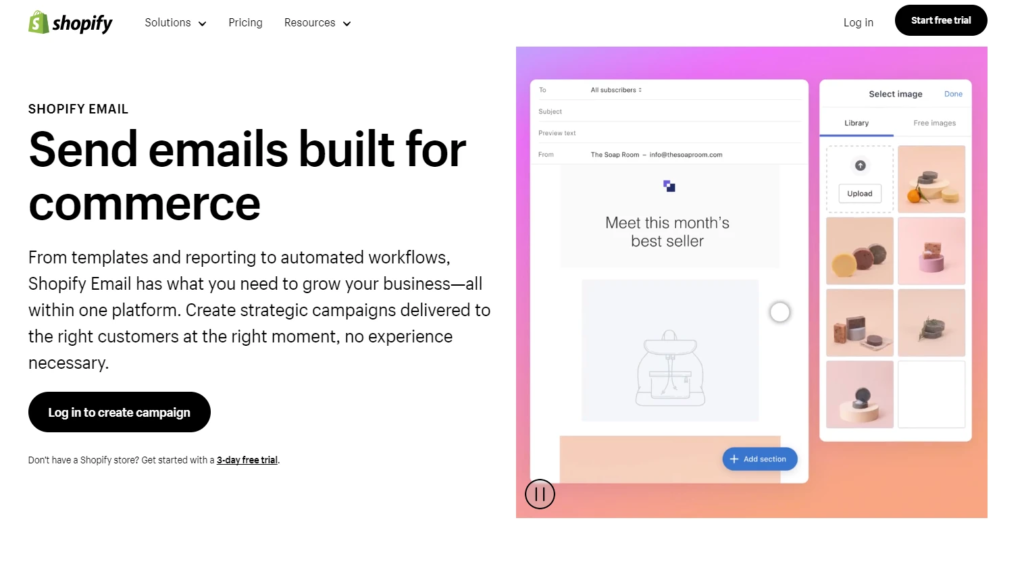
Ecwid SEO and Marketing Tools
Ecwid also provides a selection of SEO tools to help improve your store’s SERP ranking:
- SEO-Friendly Features: Ecwid includes SEO-friendly URLs, microdata, and the ability to edit page titles, descriptions, and product details for better visibility.
- Automatic Sitemaps: Similar to Shopify, Ecwid generates sitemaps automatically to improve search engine indexing.
- Canonical URLs: To prevent duplicate content issues, Ecwid uses canonical URLs, which is another SEO best practice.
For marketing, Ecwid offers:
- Promotions and Discounts: You can create discount coupons and sale promotions within Ecwid’s platform, which is essential for marketing initiatives.
- Social Media Tools: Ecwid provides options to sell on social media and integrates with platforms like Facebook and Instagram.
- Email Marketing: Integration with popular email marketing services like Mailchimp is available, allowing you to engage with your customer base effectively.
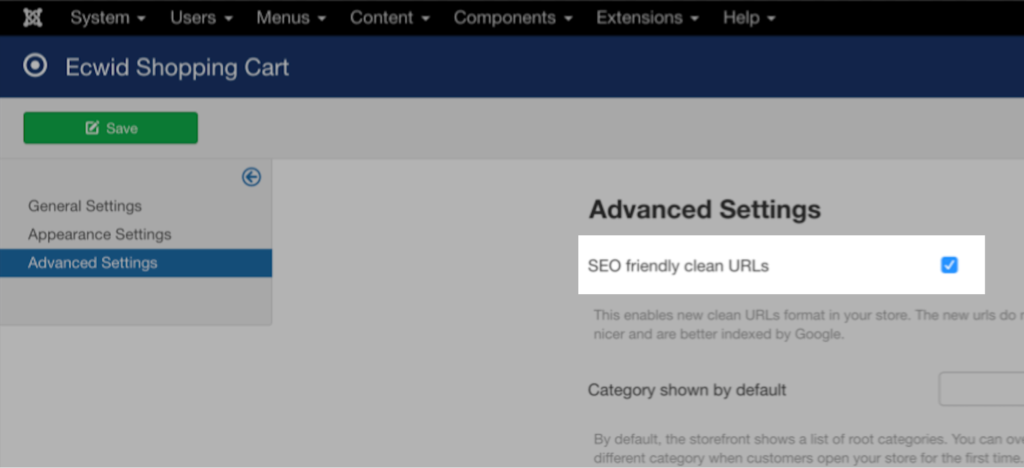
Both Shopify and Ecwid’s marketing tools are designed to help you reach a wider audience and engage with customers effectively. While Shopify has more in-house marketing tools, Ecwid’s integrations with external marketing services mean you have the flexibility to choose the tools that best fit your strategy.
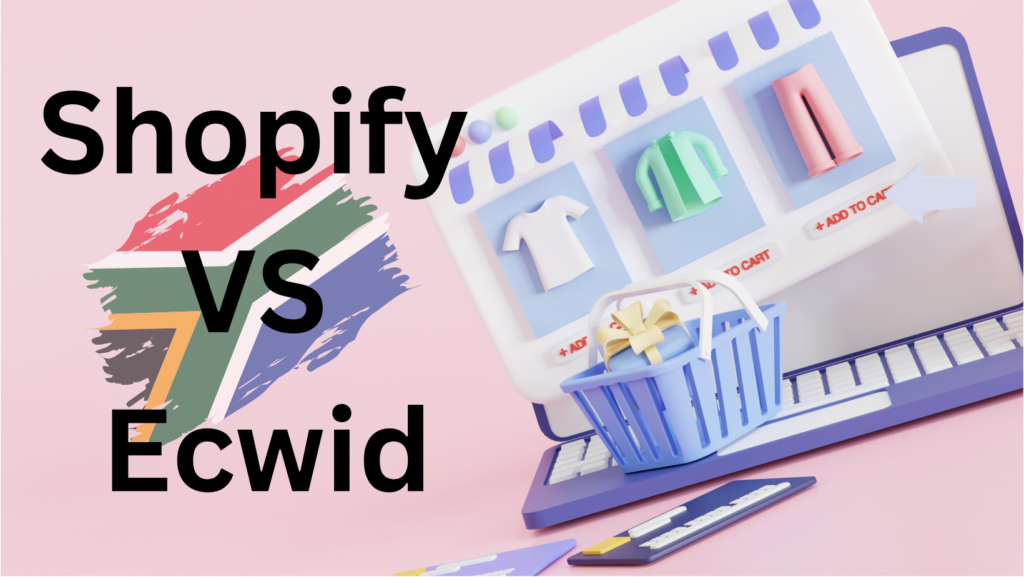
In summary, both Shopify and Ecwid offer a range of SEO and marketing tools to help you optimize your online store and reach your target audience. Shopify has a more extensive range of built-in tools and apps, which can be a significant advantage if you’re looking for an all-in-one solution. Ecwid, while offering fewer in-built marketing features, provides strong SEO capabilities and great integrations with external marketing tools.
When considering SEO and marketing tools, think about your marketing strategy and how much work you’re willing to do outside of your e-commerce platform. If you prefer a platform that offers a wide variety of in-built tools, Shopify might be more suitable. If you’re comfortable using third-party tools and services for your marketing efforts, Ecwid’s flexibility could be a better fit for your business.
Mobile Responsiveness and App Availability
In today’s fast-paced digital world, mobile responsiveness and app availability are key to the success of any e-commerce platform. Both Shopify and Ecwid recognize this and have taken steps to ensure their users can offer a seamless shopping experience on mobile devices.
Shopify Mobile Responsiveness and App Availability
Shopify is renowned for its strong focus on mobile responsiveness:
- Responsive Themes: All Shopify themes are mobile-responsive, ensuring that your online store looks great and functions well on any device.
- Mobile App: Shopify offers a mobile app that allows store owners to manage their stores on the go. You can add products, process orders, and keep an eye on your store’s performance from your mobile device.
- Mobile Checkout: Shopify provides a streamlined mobile checkout process, which is crucial for reducing cart abandonment rates on mobile.
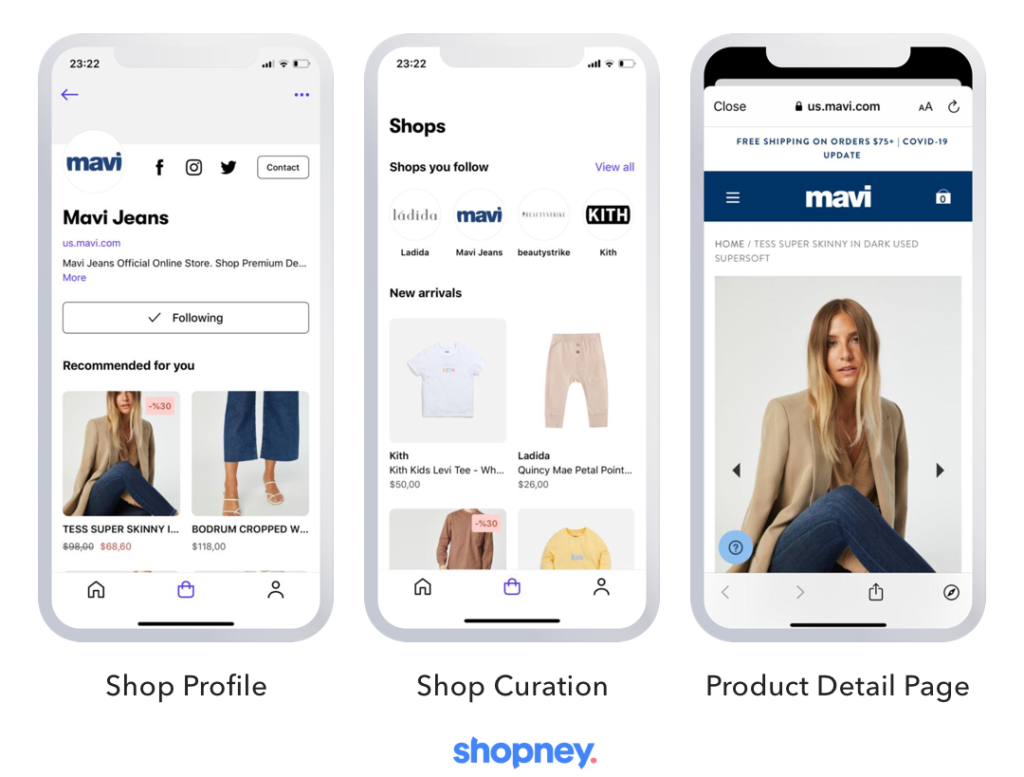
Shopify also offers app availability across various mobile platforms:
- Shopify POS: The POS app integrates with your online store, allowing you to sell in-person and accept payments on your mobile device.
- Third-Party Apps: Shopify’s App Store features numerous apps that are designed to enhance mobile responsiveness and overall functionality.
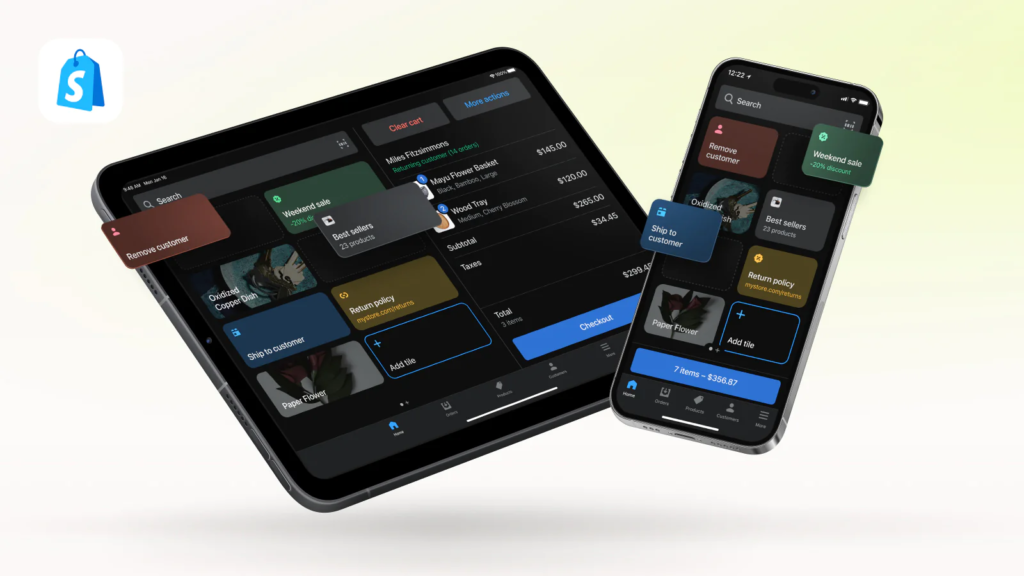
Ecwid Mobile Responsiveness and App Availability
Ecwid also places a high priority on mobile responsiveness:
- Mobile-Optimized Shopping: Ecwid stores are optimized for mobile devices, ensuring that customers have a smooth experience when browsing and buying from a smartphone or tablet.
- Ecwid Mobile App: The Ecwid app lets you manage your store from anywhere, offering features like mobile inventory management and order processing.
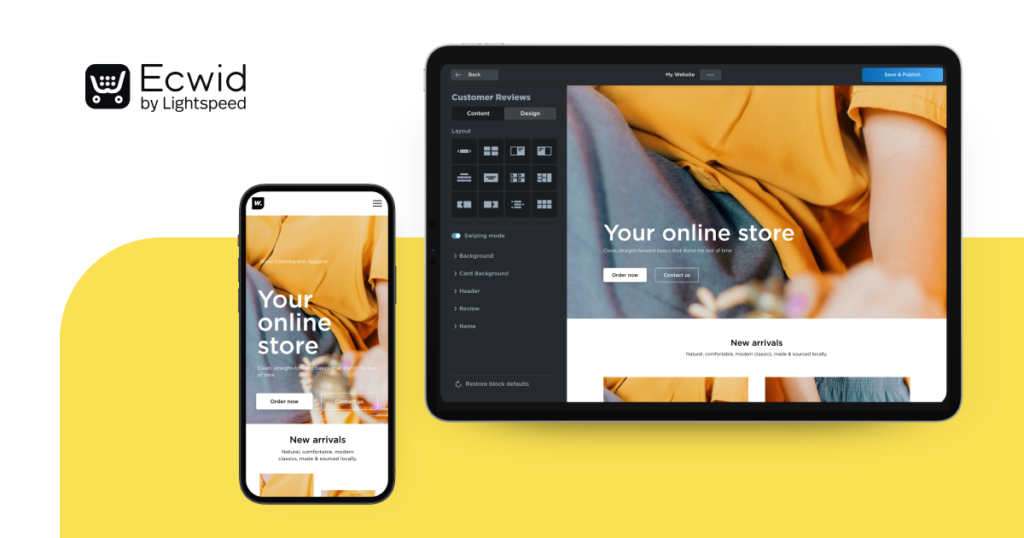
When it comes to app availability, Ecwid provides:
- Ecwid POS: Like Shopify, Ecwid offers a POS solution that works with mobile devices, allowing for sales in physical locations.
- App Market: Although smaller than Shopify’s, Ecwid’s App Market still offers a variety of apps to enhance your store, including several designed specifically for mobile use.

Both Shopify and Ecwid understand the importance of providing a mobile-friendly shopping experience, and both offer robust solutions to ensure customers can easily navigate and purchase from your store on their mobile devices.
In summary, Shopify and Ecwid both excel in mobile responsiveness and offer comprehensive app availability to enhance the mobile e-commerce experience. Shopify stands out with its wide array of specialized mobile apps and a large collection of responsive themes. Ecwid offers a more streamlined set of mobile tools, which are still more than capable of providing an excellent mobile shopping experience.
When considering mobile responsiveness and app availability, reflect on your and your customers’ mobile usage patterns. If a majority of your customers shop on mobile devices, prioritize a platform known for its strong mobile features. Also, consider how often you’ll manage your store on the go, as this will influence your need for a robust mobile app for store management. Both Shopify and Ecwid will provide the mobile capabilities necessary for a modern online store, with Shopify offering a slight edge in terms of variety and specialization.
Sales Channels
Expanding your online store across multiple sales channels is a powerful way to increase reach and drive more sales. Both Shopify and Ecwid offer the capability to sell on various platforms, from social media to online marketplaces.
Shopify Sales Channels
Shopify excels in providing a wide array of sales channels, making it easy for merchants to connect with customers wherever they are:
- Online Marketplaces: Integrate with popular marketplaces like Amazon and eBay to reach a vast audience.
- Social Media: Directly sell products on social media platforms, including Facebook, Instagram, and Pinterest, with Shopify’s native integrations.
- Shopify POS: Sell in-person and have all your inventory and sales data synced with your online store.
- Buy Button: Embed products and a checkout on any website with Shopify’s Buy Button, turning any site into a sales channel.

Shopify’s seamless integration across these channels ensures that inventory and sales data are synchronized in real-time, providing a consistent and efficient management experience.
Ecwid Sales Channels
Ecwid also offers robust sales channel integration, allowing merchants to sell across different platforms:
- Social Media Platforms: Sell on Facebook and Instagram by integrating your Ecwid store with your social media profiles.
- Online Marketplaces: Connect to major marketplaces like Amazon and eBay to tap into their massive user base.
- Google Shopping: List your products on Google Shopping and reach customers through search.
- Ecwid Starter Site: Even if you don’t have your own website, Ecwid provides a free starter site that acts as another sales channel.

Ecwid’s approach focuses on ensuring that small to medium-sized businesses can quickly expand their sales channels without complexity.
In conclusion, both Shopify and Ecwid provide excellent opportunities to broaden your sales horizons. Shopify offers a more extensive range of integrated sales channels, which can be a significant advantage for businesses looking to maximize their reach. Ecwid, while offering fewer in-built options, still covers the essential sales channels and is straightforward to use, making it a solid choice for those who prefer simplicity and ease of use.
When evaluating sales channels, consider where your target customers are most likely to shop and ensure that your chosen e-commerce platform supports those channels effectively. Both Shopify and Ecwid can help you achieve a multi-channel retailing strategy, but the specific needs of your business will determine which platform is the better fit.
Global Commerce Capabilities
In a world that’s increasingly connected, global commerce capabilities are essential for online stores looking to tap into international markets. Both Shopify and Ecwid offer features that help businesses extend their reach to customers around the world.
Shopify Global Commerce Capabilities
Shopify’s global commerce features are comprehensive, catering to businesses looking to scale internationally:
- Multi-Currency Support: Shopify Payments allows customers to shop and check out in their local currency, enhancing the customer experience and increasing conversion rates.
- International Domains and Stores: Create unique URLs for different countries or regions, optimizing SEO and customer experience in each location.
- Localized Payment Options: Offer a wide range of payment methods preferred by customers in different countries.
- Global Shipping and Tax Calculations: Shopify can automatically handle tax calculations and offers extensive shipping options to deliver products worldwide.
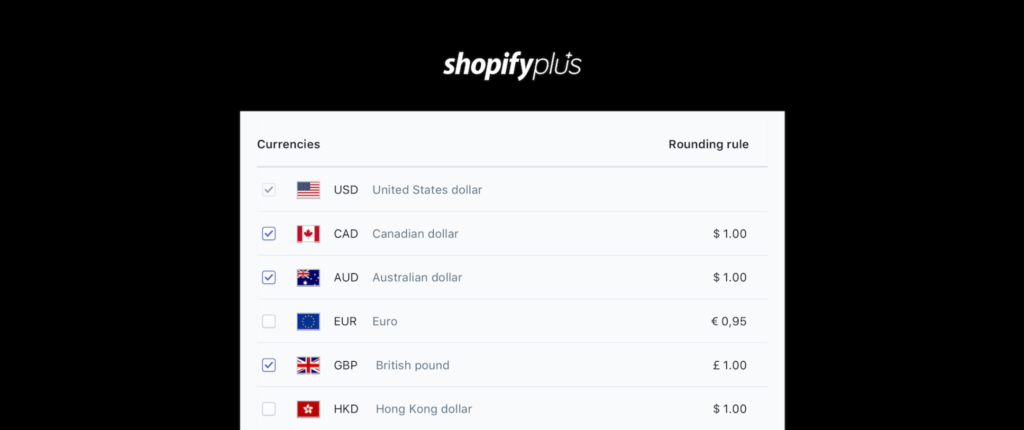
Shopify’s global commerce capabilities ensure that your store can offer a local feel to customers, no matter where they are.
Ecwid Global Commerce Capabilities
Ecwid also provides a set of tools to help stores go global:
- Multi-Currency Functionality: Customers can see prices and make transactions in their local currency, making your store more accessible to a global audience.
- Automatic Tax Calculations: Ecwid can automatically calculate the correct amount of tax to charge based on the customer’s location.
- Multiple Language Support: The platform supports over 50 languages, allowing your store to automatically translate based on the customer’s preferences.
- Integrated International Shipping: Partner with global shipping carriers and calculate shipping rates in real-time for different countries.
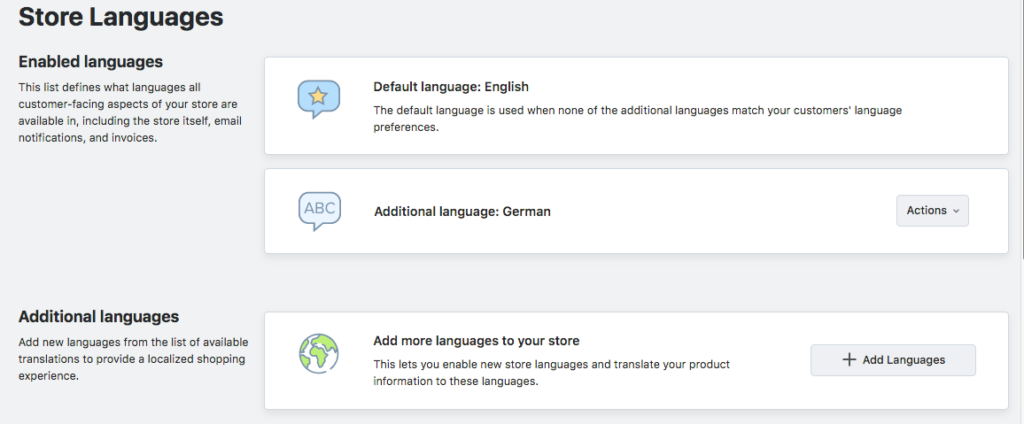
Ecwid’s global commerce tools are particularly user-friendly, making it easy for small businesses to start selling to international customers without a steep learning curve.
In summary, global commerce capabilities are no longer just nice-to-have but a necessity for online businesses aiming to reach customers across borders. Shopify stands out with a more extensive suite of tools designed for larger businesses that need advanced features for international expansion. Ecwid offers a straightforward and effective set of features suitable for small to medium-sized businesses venturing into global markets.
When considering global commerce capabilities, it’s essential to evaluate how each platform’s features align with your international business strategy. Consider the level of support for currencies, languages, tax and shipping logistics, and localized payment methods. Both Shopify and Ecwid can help break down geographical barriers, but your choice will depend on the specific needs and scale of your global operations.
Security and Reliability
When running an online store, security and reliability are paramount. Customers trust you with their personal and payment information, and a single breach can severely damage that trust. Both Shopify and Ecwid take these concerns seriously and have implemented robust measures to ensure their platforms are secure and reliable.
Shopify Security and Reliability
Shopify is a leading e-commerce platform that offers a high level of security and reliability:
- PCI DSS Compliance: Shopify is certified Level 1 PCI DSS compliant, which is the highest level of security in the payments industry.
- SSL Certificates: All Shopify stores include a 256-bit SSL certificate at no additional cost, ensuring that data passed between the web server and browsers remain private.
- Uptime and Performance: Shopify boasts a 99.98% uptime, ensuring your store is always available to your customers.
- Fraud Analysis: Shopify provides built-in fraud analysis features to help you identify and manage potentially fraudulent orders.
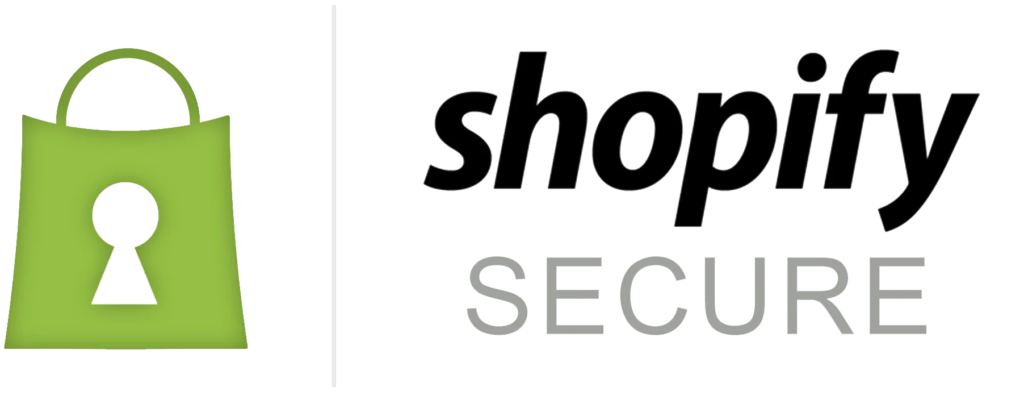
Shopify’s commitment to security and reliability means that merchants can focus on growing their businesses with peace of mind.
Ecwid Security and Reliability
Ecwid also understands the importance of security and reliability in e-commerce:
- PCI DSS Validated: Ecwid is a PCI DSS validated Level 1 Service Provider which is the gold standard for e-commerce solutions worldwide.
- SSL Encryption: Ecwid ensures that all transaction data is protected with the same level of security that banks use, safeguarding customer information.
- Automatic Backups and Updates: The platform regularly updates and backs up your store data to keep it secure and ensure you have the latest features.
- Uptime Guarantee: Ecwid provides a reliable shopping cart service with a consistent uptime record, so your store is always open for business.

Ecwid’s approach to security and reliability is designed to be seamless and efficient, giving small to medium-sized businesses a secure and dependable online presence.
In conclusion, security and reliability should be at the forefront of any merchant’s mind when choosing an e-commerce platform. Both Shopify and Ecwid offer robust security measures and reliable hosting, ensuring that your store remains safe and accessible to your customers. While features and specific offerings may vary slightly, the commitment to protecting both merchants and customers alike is evident in both platforms.
When selecting an e-commerce solution, it’s crucial to consider not just the security certifications and protocols in place but also the track record of performance and uptime. A secure and reliable online store can enhance customer trust and loyalty, leading to increased sales and a stronger brand reputation. Shopify and Ecwid are both trustworthy platforms that businesses can rely on for their e-commerce needs.
Scalability
Scalability in e-commerce is about the ability of a platform to grow and handle an increasing number of customers, sales, and data without compromising performance. For businesses planning to expand, selecting an e-commerce platform with strong scalability capabilities is crucial.
Shopify Scalability
Shopify is renowned for its scalability, making it an ideal choice for businesses of all sizes, from small startups to large enterprises:
- Flexible Plans: Shopify offers tiered plans, ranging from basic to advanced, that accommodate the growing needs of your business.
- Robust Infrastructure: With a reliable infrastructure, Shopify can manage high traffic volumes and transaction loads, particularly during peak sales periods.
- App Ecosystem: Extend the functionality of your store as it grows with access to over 4,000 apps in the Shopify App Store.
- Advanced Features: For larger businesses, Shopify Plus provides advanced features like automation, detailed analytics, and dedicated support.
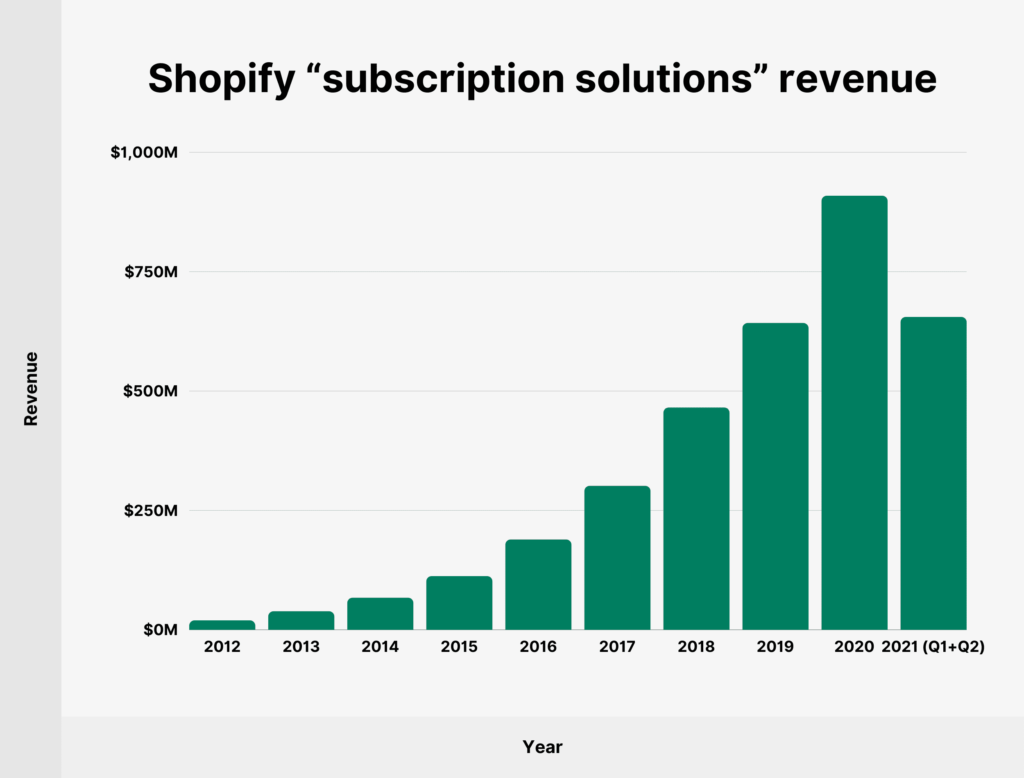
Shopify’s platform is designed to scale with your business, providing the tools necessary to handle increased demand smoothly.
Ecwid Scalability
Ecwid is also a scalable solution, catering primarily to small and medium-sized businesses that are looking to grow:
- Upgradeable Plans: Start with a free plan and upgrade as your business needs evolve, with various features unlocked at each level.
- Cloud-Based Platform: As a cloud-based service, Ecwid can scale without the need for manual intervention, ensuring consistent performance.
- Integration Options: Scale your store by integrating with various other platforms and services, including social media and marketplaces.
- Mobile Optimization: Ecwid stores are optimized for mobile devices, allowing businesses to capitalize on the growing mobile shopping trend.

Ecwid’s ease of use and straightforward upgrading process make it an attractive option for growing businesses looking for a hassle-free scalability path.
In conclusion, scalability is a key consideration for any business with aspirations to grow. Both Shopify and Ecwid offer scalable e-commerce solutions, but they cater to different types of businesses. Shopify is well-suited for businesses that anticipate rapid growth and require a robust infrastructure, while Ecwid is perfect for smaller businesses that need a simple, effective way to scale up. It is essential to evaluate each platform’s scalability features against your business goals to ensure that your chosen e-commerce platform can support your growth both now and in the future.
Conclusion
In summary, when it comes to establishing and growing an online presence in the e-commerce space, the selection of a platform is crucial. Both Shopify and Ecwid offer robust solutions tailored to businesses with different needs. Understanding the core differences in their offerings can help you make an informed decision that aligns with your business objectives.
Key Takeaways on Shopify:
- Shopify excels in providing a comprehensive, all-in-one e-commerce solution with extensive customization options through its vast app marketplace.
- Its scalability features make it suitable for businesses of all sizes that are eyeing rapid growth and international expansion.
- The platform’s focus on security, reliability, and global commerce capabilities ensures that businesses can operate with confidence.

Key Takeaways on Ecwid:
- Ecwid is ideal for small to medium-sized businesses seeking an easy-to-use, cost-effective e-commerce solution that integrates smoothly with existing websites.
- While it offers scalability, it is particularly user-friendly for businesses that are in the initial stages of growth.
- Security, reliability, and global commerce features are also strong suits of Ecwid, allowing businesses to provide a safe shopping experience.

Final Thoughts:
Security, reliability, global commerce capabilities, and scalability are the pillars of a strong e-commerce platform. Shopify and Ecwid both address these areas effectively but cater to different market segments and business sizes. Your choice should be informed by your current needs, growth plans, and the level of investment you are willing to make in your e-commerce infrastructure.
Whether you’re just starting out or looking to expand your online business, both Shopify and Ecwid offer viable paths to success. By weighing their features against your business’s specific needs, you can choose a platform that not only supports your current operations but also paves the way for future growth and success.

